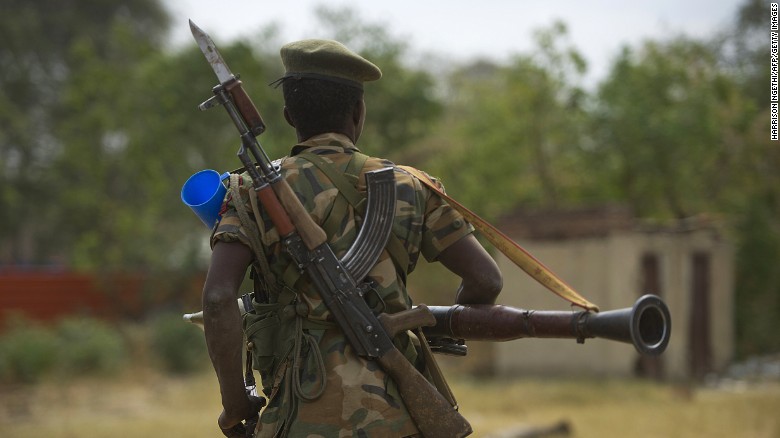Story highlights
- More than 60,000 people flee South Sudan in July
- Aid organizations are struggling to contain malnutrition, cholera, sexual violence among civilians
(CNN)Violence in South Sudan over the past three weeks has prompted a massive flight of refugees into neighboring countries, according to the United Nations.
More than 60,000 people, most of whom are women and children, have fled the country since fighting began at the end of June, the U.N.'s refugee agency UNHCR reported on Tuesday.
"The refugees have brought to us very disturbing reports," UNHCR Spokesman Melissa Fleming said at a briefing in Geneva.
Armed groups "are looting villages, murdering civilians, and forcibly recruiting young men and boys into their ranks," Fleming said. "We are very concerned, and are appealing for parties to move back to the peace agreement."
Despite a peace deal brokered on July 11, clashes between forces loyal to the country's President Salva Kiir and those allied with former Vice President Riek Machar are ongoing.
James Gatdet Dak, a spokesman for Machar, said at least 111 people died over the weekend in clashes outside Juba. Kiir's camp denied this, and said the peace deal is still in effect.
The U.S. State Department condemned the continued fighting on Saturday, calling for "an immediate halt to combat operations." Aid groups on the ground, such as Mercy Corps, reported there are hundreds of people wounded in Juba's hospitals.
"Whether or not the South Sudan peace deal can still take hold is today a serious concern," the Mercy Corps said.
First vice president ousted
The world's newest country has been embroiled in one of the world's most brutal conflicts since December 2013, when Kiir ousted Machar as South Sudan's first vice president and accused soldiers loyal to his rival of staging a coup. That sparked the current round of violence and inflamed ethnic tensions in the country. Kiir is a member of the country's majority Dinka population, while Machar is Nuer, the country's second-largest ethnic group.
Since the conflict started, the United Nations estimates that close to 900,000 people have fled the violence in South Sudan into neighboring countries. According to the Council of Foreign Relations, over 50,000 people have been killed.
Machar was reinstated as vice president in February as part of a deal to end the country's civil war. But after renewed fighting at the start of July, Machar fled the country and said he was being targeted by Kiir's troops.
Last week, Kiir removed Machar again from his post, replacing him with Taban Deng Gai, who had previously served as Machar's chief negotiator, as well as the country's mining minister.
"When [Machar] decided to leave Juba, he abandoned the whole leadership of his movement," Kiir's spokesman, Michael Makuei Lueth, said in a televised statement on Tuesday. "As such, he was removed."
Machar's spokesman immediately called the replacement illegal in a Facebook post.
Agriculture Minister Lam Akol announced his resignation from Kiir's administration on Monday. He said the latest peace deal was dead, and said "one cannot with a clear conscience serve under such a regime."
Hunger, cholera and sexual violence
Of the 60,000 people who have fled South Sudan during the latest fighting, 52,000 have crossed into Uganda.
"Refugees are arriving tired and hungry, because of the precarious food situation in South Sudan," said Charlie Yaxley, spokesman for the UNHCR in Uganda. "They are suffering from malnutrition, sometimes severely so, and that rate is going up."
A significant number of people remain in South Sudan "because of the armed forces operating there, blocking roads," Yaxley said. r
The United Nations Mission in South Sudan is providing security for roughly 200,000 people in the country.
The mission on Monday condemned "deeply disturbing reports" of widespread sexual violence against women and girls by soldiers, as well as unidentified armed men. The agency documented at least 120 cases of sexual violence in the past two weeks, with some incidents taking place near U.N. Protection of Civilian sites.
Another concern is the recent cholera outbreak in and around Juba. Since July 25, UNICEF has reported close to 300 suspected cases of cholera. With the rainy season in full swing, the outlook for containing a waterborne disease is grim.
"The constant rains are creating a breeding ground for mosquitoes," said Mercy Corps Director Deepmala Mahla. "We're worried about the disease's spread."





